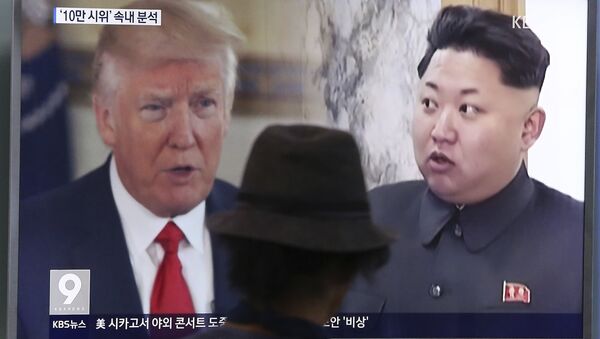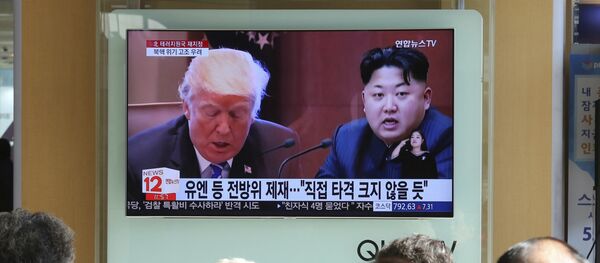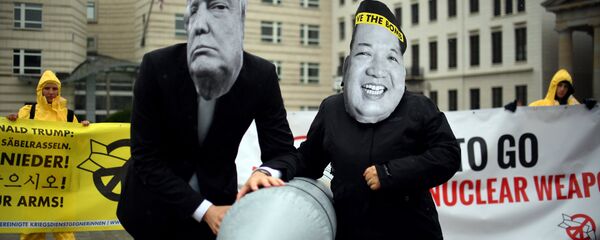If the negotiations between US President Donald Trump and North Korean leader Kim Jong-un go smoothly it will significantly reduce tensions on the Korean Peninsula, says Liu Chao, a specialist on Korean affairs at the Liaoning Academy of Social Sciences.
"[Beijing] attaches great importance to the fact that the tensions on the Korean Peninsula are fading," Liu told Sputnik China. "Since China is a large state in Northeast Asia, the situation in the region directly concerns its [national] interests and security. China has always been keeping an eye on the development of the situation on the Korean Peninsula, particularly, on the denuclearization issue."
The academic noted that China had repeatedly emphasized the importance of direct negotiations between the US and the Democratic People's Republic of Korea (DPRK), stressing that the Korean nuclear problem had long been fueled by contradictions between Washington and Pyongyang.
"Therefore, China will promote the negotiations between the US and North Korea on the denuclearization issue in every way possible," Liu highlighted.
Following his two-day visit to Pyongyang, South Korean National Security Adviser Chun Eui-yong announced on March 6 that the DPRK was ready to hold high-level meetings with South Korea and was willing to start talks with Washington on the denuclearization of the Korean Peninsula.
Two days later, Chun signaled that Trump had accepted Kim's invitation.
"Kim Jong Un talked about denuclearization with the South Korean Representatives, not just a freeze. Also, no missile testing by North Korea during this period of time. Great progress being made but sanctions will remain until an agreement is reached. Meeting being planned!" Trump tweeted on March 8.
Kim Jong Un talked about denuclearization with the South Korean Representatives, not just a freeze. Also, no missile testing by North Korea during this period of time. Great progress being made but sanctions will remain until an agreement is reached. Meeting being planned!
— Donald J. Trump (@realDonaldTrump) 9 марта 2018 г.
According to the Global Times, the upcoming meeting "is expected to create a historic milestone for peace on the peninsula." On the other hand, if the negotiations prove effective China will have an opportunity to persuade its counterparts at the UN Security Council to weaken or even lift sanctions on North Korea. In this case Beijing will resume trade relations with its northern neighbor and facilitate the DPRK's sustainable economic development.
Ba Dianjun, a researcher from the Northeast Asian Studies College at Jilin University, told Sputnik that the Trump-Kim negotiations may significantly improve the situation in the region.
"The potential talks between the US and the DPRK are the result of years of interaction between the parties," Ba underscored. "It can be said that 'everything that reaches its limit inevitably reverses itself.' Earlier we saw that the situation on the Korean Peninsula was literally on the verge of war, neighboring countries were in suspense, [some observers] did not rule out the possibility of an accidental conflict."
"If the US and North Korea manage to start a dialogue, and South and North Korea reach a peaceful solution, the situation in the region will move in the right direction. In addition, a 'side effect' [of this shift] will spread to other Northeast Asian countries," Ba suggested.
At the same time, the Chinese scholar noted that one should not expect that the dialogue between the DPRK, South Korea and the US would solve regional long-standing geopolitical issues at once: "We view it as a glimpse of hope," he remarked. "[However], if the leaders of US and North Korea sit down at the negotiating table, this will undoubtedly send a good message on the further development of the situation."
Lui also warned against jumping to conclusions over the upcoming meeting: "These are just intentions so far. We have also heard the opinions of US State Department representatives and military officials — they are not very optimistic about [the Trump-Kim talks]."
The DPRK authorities have signaled their willingness to conclude a peace agreement with the US since the time of Kim Jong-un's grandfather, the first leader of the DPRK, Kim Il Sung.
Under former US President Bill Clinton, the Americans held talks with Pyongyang on the establishment of diplomatic relations as well as the possibility of opening the US Embassy in Pyongyang. However, after George W. Bush assumed office, these plans were abolished.
The views and opinions expressed by Liu Chao, Ba Dianjun are those of the speakers and do not necessarily reflect those of Sputnik.






